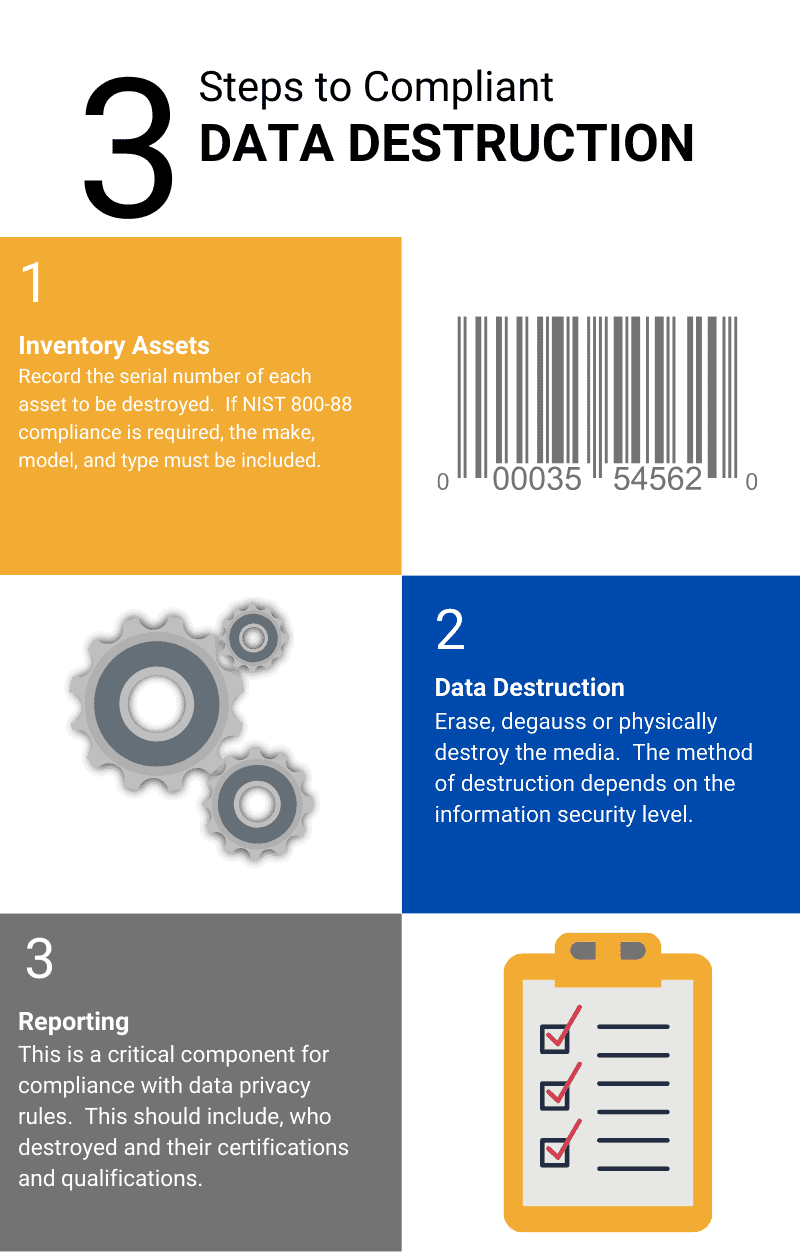The Essential Nature of Data Devastation in Upholding Computer Security Solutions and Protecting Versus Unauthorized Gain Access To
In an era where information breaches and identification theft are increasingly widespread, the significance of effective information devastation can not be overemphasized. Organizations should recognize that the failure to appropriately take care of delicate details positions not only lawful and economic risks however likewise a prospective erosion of client trust fund. Numerous techniques, from data wiping to physical damage, act as critical safeguards versus unauthorized access. Nonetheless, recognizing the ramifications of information destruction techniques and compliance with laws increases crucial questions concerning the adequacy of current approaches and their long-lasting stability in the face of evolving hazards.
Relevance of Information Damage
In a significantly electronic world, the importance of information devastation can not be overstated. As companies collect huge quantities of sensitive details, the prospective effects of stopping working to correctly get rid of and manage of that information come to be progressively extreme. Information violations, identification theft, and business reconnaissance posture significant risks, highlighting the need of efficient information damage practices.

Additionally, as technology progresses, so as well do the approaches whereby destructive actors look for to make use of sensitive details. Organizations has to remain vigilant and positive in their data damage approaches to safeguard against these advancing dangers. By focusing on data devastation, business not just protect their properties yet additionally foster trust fund amongst customers and stakeholders, showing a commitment to liable information monitoring and safety and security practices.
Methods of Effective Information Devastation
To make certain the complete and irreversible destruction of sensitive information, companies can use a selection of efficient methods tailored to their certain demands. One of the most typical techniques is data wiping, which includes making use of specialized software application to overwrite existing data several times, making recuperation virtually impossible. This is particularly helpful for solid-state drives and hard drives, where traditional removal methods are poor.
An additional effective technique is degaussing, which utilizes strong magnetic fields to interfere with the magnetic domain names on storage media, rendering the information irretrievable. This approach is particularly suited for magnetic storage devices, such as tape drives and difficult disks.
Physical damage is also a viable alternative, including the shredding, crushing, or incineration of storage tools. This approach assurances that data can not be recovered, making it optimal for companies managing very delicate information.

Conformity With Data Protection Laws
Organizations must not only focus on reliable data damage techniques however additionally make sure conformity with information security laws that govern just how delicate information is taken care of and thrown away. Following these guidelines is essential for safeguarding individual information and keeping client count on. Rules such as the General Information Defense Law (GDPR) in the European Union and the Health And Wellness Insurance Mobility and Accountability Act (HIPAA) in the USA impose strict guidelines on information management, that include demands for the safe disposal of sensitive info.
To attain conformity, companies need to execute extensive data destruction policies that line up with these legal frameworks. This consists of recognizing information that requires damage, developing protocols for safe methodsâEUR" such as shredding physical media or making use of software program that fulfills sector standards for information wipingâEUR" and maintaining in-depth documents of destruction tasks. Routine audits ought to be carried out to make sure adherence to these policies and to identify any type of potential areas for renovation.
Failure to follow data defense policies can bring about considerable legal implications, including large penalties and damages to an organization's track record. As a result, incorporating compliance into data destruction methods is not just a legal commitment yet additionally a critical element of a durable details safety and security strategy.
Repercussions of Poor Information Handling
Poor information handling can lead to serious effects that prolong beyond instant operational setbacks. Organizations might deal with significant monetary losses due to information breaches, which usually lead to pricey remediation efforts, lawful charges, and governing fines. These economic ramifications can impede and stress sources growth, inevitably affecting a company's bottom line.
Furthermore, poor information handling can seriously damage an organization's reputation. Stakeholders, partners, and consumers might shed rely on an entity that stops working to safeguard delicate details, resulting in reduced customer commitment and prospective loss of organization chances. This disintegration of trust fund can take years to restore, if it can be restored in all.
Furthermore, companies might deal with lawful implications emerging from non-compliance with data defense laws. Such infractions might result in examinations my website and penalties, worsening the economic problem and more tainting the organization's picture.
In the realm of cybersecurity, insufficient data monitoring techniques can create vulnerabilities that make systems extra at risk to unapproved gain access to and cyberattacks. Ultimately, these repercussions underscore the critical importance of applying robust information taking care of procedures to secure delicate details and preserve organizational honesty.
Best Practices for Secure Information Disposal


First of all, data must be identified according to its sensitivity. Delicate info requires more strenuous disposal approaches, such as shredding physical documents and using sophisticated software program for digital data wiping. Using certified data devastation solutions makes certain compliance with industry guidelines and requirements.
Secondly, companies need to carry out a data disposal plan that mandates routine audits. This plan should describe the procedures for data retention and devastation, making sure that out-of-date data is disposed of without delay and firmly. Educating workers on these methods is crucial to fostering a society of protection understanding.
Last but not least, maintaining thorough documents of disposed data enhances accountability and offers a this post clear audit route. This documents ought to consist of the sort of information destroyed, the method utilized, and the date of disposal.
Conclusion
Taking on durable methods such as information cleaning, degaussing, and physical damage, together with conformity with laws like GDPR and HIPAA, is important for protecting sensitive info. Ignoring proper data disposal techniques can lead to severe effects, including information violations and lawful effects.
In an era where data violations and identity burglary are increasingly prevalent, the value of reliable data destruction can not be overstated. data destruction. Data violations, identification theft, and company reconnaissance posture substantial risks, highlighting the requirement of reliable data devastation practices
Compliance with guidelines such as GDPR and HIPAA mandates that organizations carry out strict data defense procedures, consisting of the safe destruction of data at the end of its lifecycle.
By focusing on data damage, business not only protect their assets yet likewise foster depend on among customers and stakeholders, showing a commitment to accountable information management and security methods.
Organizations should not only focus on effective information damage techniques however likewise make certain compliance site web with information protection policies that regulate exactly how sensitive information is taken care of and disposed of.